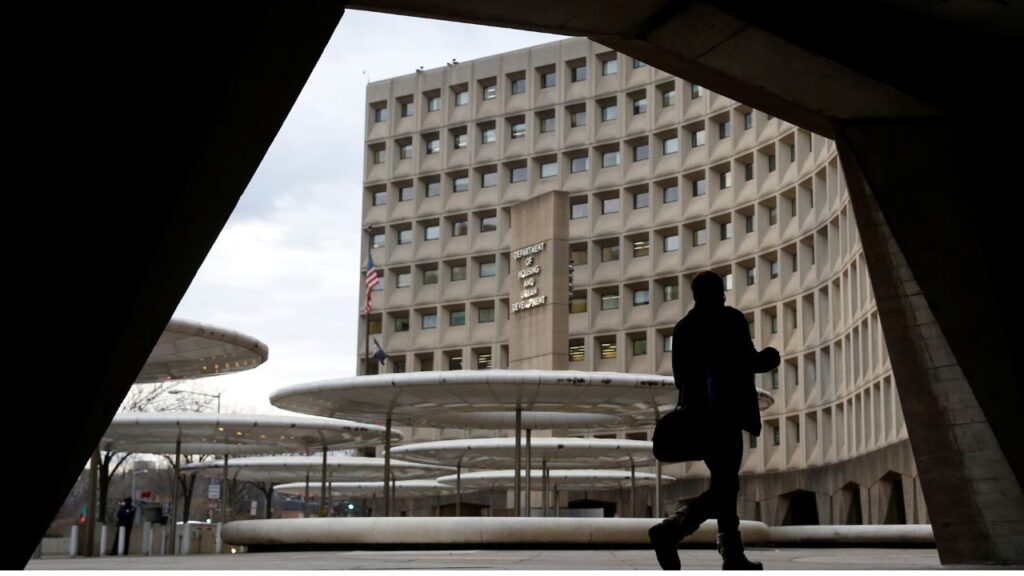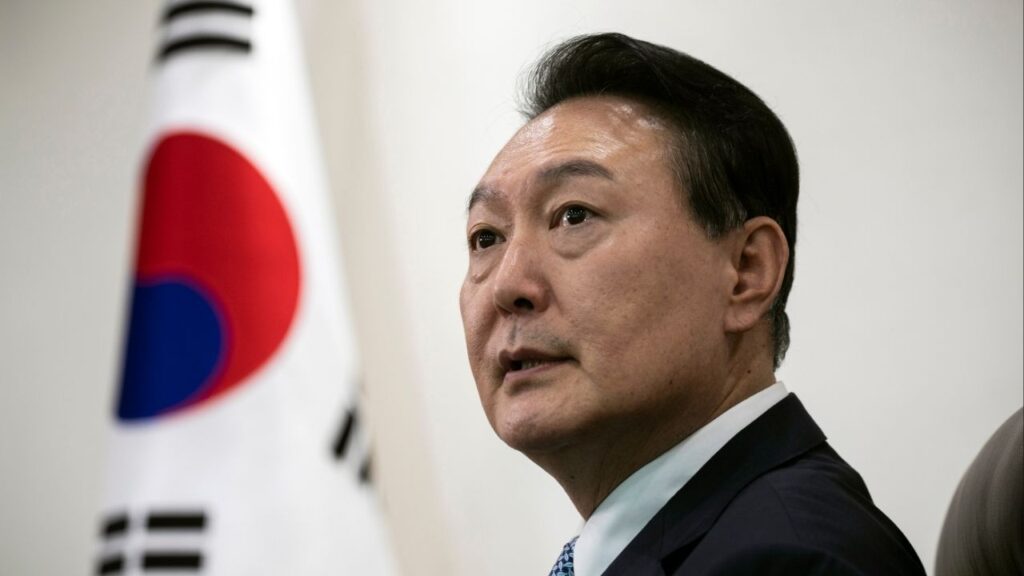Share
|
Getting your Trinity Audio player ready...
|
DEIR AL-BALAH, Gaza Strip — Nearly three dozen trucks entered Gaza on Sunday in the largest aid convoy since the war between Israel and Hamas began, but humanitarian workers said the assistance still fell desperately short of needs after thousands of people broke into warehouses to take flour and basic hygiene products.
The Gaza Health Ministry said the death toll among Palestinians passed 8,000, mostly women and minors, as Israeli tanks and infantry pursued what Israeli Prime Minister Benjamin Netanyahu called a “second stage” in the war ignited by Hamas’ brutal Oct. 7 incursion. The toll is without precedent in decades of Israeli-Palestinian violence. Over 1,400 people have died on the Israeli side, mainly civilians killed during the initial attack, also an unprecedented figure.
Communications were restored to most of Gaza’s 2.3 million people Sunday after an Israeli bombardment described by residents as the most intense of the war knocked out phone and internet services late Friday.
Israel has allowed only a trickle of aid to enter. On Sunday, 33 trucks carrying water, food and medicine entered the only border crossing from Egypt, a spokesperson at the Rafah crossing, Wael Abo Omar, told The Associated Press.
After visiting the Rafah crossing, the chief prosecutor of the International Criminal Court called the suffering of civilians “profound” and said he had not been able to enter Gaza. “These are the most tragic of days,” said Karim Khan, whose court has been investigating the actions of Israeli and Palestinian authorities since 2014.
Khan called on Israel to respect international law but stopped short of accusing it of war crimes. He called Hamas’ Oct. 7 attack a serious violation of international humanitarian law. “The burden rests with those who aim the gun, missile or rocket in question,” he said.
The Israeli military said Sunday that it had struck more than 450 militant targets over the past 24 hours, including Hamas command centers and anti-tank missile launching positions. Huge plumes of smoke rose over Gaza City. Military spokesman Rear Adm. Daniel Hagari said dozens of militants were killed.
Hagari, who said ground operations were intensifying, also reiterated calls for Gaza residents to move south, saying they’d have better access to food, water and medicine there.
“This is a matter of urgency,” he said.
Israel says most Gaza residents have heeded its orders to flee to the southern part of the besieged territory, but hundreds of thousands remain in the north, in part because Israel has also bombarded targets in so-called safe zones. More than 1.4 million people in Gaza have fled their homes.
The Hamas military wing said its militants clashed with Israeli troops who entered the northwest Gaza Strip with small arms and anti-tank missiles. Palestinian militants have continued firing rockets into Israel, including toward its commercial hub, Tel Aviv.
‘Civil Order Is Starting to Break Down’ in Gaza
The aid warehouse break-ins were “a worrying sign that civil order is starting to break down after three weeks of war and a tight siege on Gaza,” said Thomas White, Gaza director for the U.N. agency for Palestinian refugees, known as UNRWA. “People are scared, frustrated and desperate.”
UNRWA spokesperson Juliette Touma said the crowds broke into four facilities on Saturday. She said the warehouses did not contain any fuel, which has been in critically short supply since Israel cut off all shipments. Israel says Hamas would use it for military purposes and that the militant group is hoarding large fuel stocks for itself in the territory. That claim couldn’t be independently verified.
One warehouse held 80 tons of food, the U.N. World Food Program said. It emphasized that at least 40 of its trucks need to cross into Gaza daily just to meet growing food needs.
President Joe Biden in a call with Netanyahu on Sunday “underscored the need to immediately and significantly increase the flow of humanitarian assistance to meet the needs of civilians in Gaza,” the U.S. said.
Israeli authorities said they would soon allow more humanitarian aid to enter Gaza.
But the head of civil affairs at COGAT, the Israeli defense body responsible for Palestinian civilian affairs, provided no details on how much aid would be available. Elad Goren also said Israel has opened two water lines in southern Gaza within the past week. The AP could not independently verify that either line was functioning.
Meanwhile, crowded hospitals in Gaza came under growing threat. Residents living near Shifa Hospital, the territory’s largest, said Israeli airstrikes overnight hit near the complex where tens of thousands of civilians are sheltering. Israel accuses Hamas of having a secret command post beneath the hospital but has not provided much evidence. Hamas denies the allegations.
The Palestinian Red Crescent rescue service said nearby Israeli airstrikes damaged parts of another Gaza City hospital after it received two calls from Israeli authorities on Sunday ordering it to evacuate. Some windows were blown out, and rooms were covered in debris. The rescue service said airstrikes have hit as close as 50 meters (yards) from the Al-Quds Hospital where 14,000 people are sheltering.
Israel ordered the hospital to evacuate more than a week ago, but it and other medical facilities have refused, saying evacuation would mean death for patients on ventilators.
“Under no circumstances, hospitals should be bombed,” the director general of the International Committee of the Red Cross, Robert Mardini, told CBS’ “Face the Nation.”
About 20,000 people were sheltering at Nasser Hospital, emergency director Dr. Mohammed Qandeel said. “I brought my kids to sleep here,” said one displaced resident who gave her name only as Umm Ahmad. “I used to be afraid of my kids playing in the sand. Now their hands are dirty with the blood on the floor.”
An Israeli airstrike hit a two-story house in Khan Younis on Sunday, killing at least 13 people, including 10 from one family. The bodies were brought to the nearby Nasser Hospital, according to an AP journalist at the scene.
The military escalation has increased domestic pressure on Israel’s government to secure the release of 239 hostages seized by Hamas fighters during the Oct. 7 attack.
Hamas says it is ready to release all hostages if Israel releases all of the thousands of Palestinians held in its prisons. Desperate family members of the Israeli captives met with Netanyahu on Saturday and expressed support for an exchange. Israel has dismissed the Hamas offer.
“If Hamas does not feel military pressure, nothing will move forward,” Israeli Defense Minister Yoav Gallant told families of the hostages Sunday.
The Israeli military has stopped short of calling its gradually expanding ground operations inside Gaza an all-out invasion. Casualties on both sides are expected to rise sharply as Israeli forces and Palestinian militants battle in dense residential areas.
Israel says it targets Hamas fighters and infrastructure and that the militants operate among civilians, putting them in danger.
The violence has inflicted serious damage on Gaza’s civilian infrastructure. The territory’s sole power plant shut down shortly after the war began. Hospitals are struggling to keep emergency generators running to operate incubators and other life-saving equipment, and UNRWA is trying to keep water pumps and bakeries running. As water ran short, some Gazans bathed in the sea.
The fighting has raised concerns that the violence could spread across the region. Israel and the Lebanese militant group Hezbollah have engaged in daily skirmishes along Israel’s northern border. Hagari said Israel on Sunday struck three militant cells that fired from Lebanon into Israel and killed militants who were trying to enter. Hamas said its forces in Lebanon fired 16 missiles at the Israeli city of Nahariya. Hezbollah, a Hamas ally, said it also fired missiles at several sites.
The Israeli military said early Monday that its aircraft hit military infrastructure in Syria after rockets from there fell in open Israeli territory.
Roughly 250,000 Israelis have been evacuated from their homes because of violence along the border with Gaza and the northern border with Lebanon, according to the Israeli military.
RELATED TOPICS:
Categories

Will Thunderstorms Cap Wild Wet Fresno Weather Tonight?

















